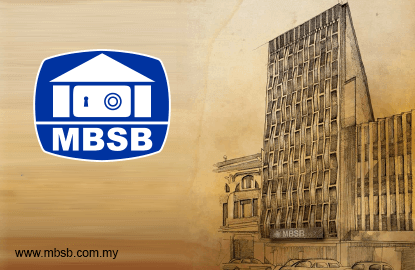
This article first appeared in The Edge Malaysia Weekly, on March 7 - 13, 2016.
 NEWS of Tan Sri Chua Ma Yu’s emergence as a substantial shareholder in Malaysia Building Society Bhd (MBSB) last week, not surprisingly, generated strong interest in the non-bank lender’s shares.
NEWS of Tan Sri Chua Ma Yu’s emergence as a substantial shareholder in Malaysia Building Society Bhd (MBSB) last week, not surprisingly, generated strong interest in the non-bank lender’s shares.
Chua, a billionaire investor known for his savvy stock-market moves, acquired a 3.76% direct stake (or 106.67 million shares) and a 2.3% indirect stake (65.23 million shares) in MBSB on Monday, according to a filing to Bursa Malaysia on Wednesday.
With that, he now holds 6.05% equity interest in MBSB and is the second largest shareholder after the Employees Provident Fund (EPF), which has a controlling 65% stake.
The following day, MBSB’s share price jumped 6.1% or 8 sen to close at RM1.40 on stronger-than-usual trading volume of 3.79 million shares. The volume was more than twice that of the previous day. The stock edged up a further four sen on Friday, closing at RM1.44 on 3.26 million shares.
Analysts tend to see the stock as a merger and acquisition (M&A) play, given how MBSB has often stated that it plans to become a full-fledged Islamic financial institution by merging with a rival Islamic lender.
Given Chua’s astute stock-market moves in the past, some are wondering if his entry is in anticipation of a potential corporate development at MBSB.
It isn’t the first time Chua has acquired shares in MBSB. In the group’s 2013 annual report, the 63-year-old’s name was in the list of its 30 largest shareholders via three pledged securities accounts, with a collective interest of 1.61% as at Feb 28, 2014.
That was about four months before Bank Negara Malaysia gave the green light for MBSB, CIMB Group Holdings Bhd and RHB Capital Bhd to commence discussions on a merger that would create the country’s largest standalone Islamic lender. However, the merger was called off in January last year after six months of talks, as economic conditions deteriorated.
A few months later, MBSB started merger talks with Bank Muamalat Malaysia Bhd. But that too was aborted just last month, as the parties could not agree on a deal.
Analysts and industry sources say it is unlikely MBSB will attempt another M&A exercise so soon, after two failed attempts over the last 12 months.
“The stock is one of the most undervalued financial stocks. I suspect he [Chua] might have got in because he saw value in it, hoping to ride on any M&A that might come later. MBSB’s financial results haven’t been all that great of late, but that’s mainly because of its impairment programme,” says an industry source familiar with Chua’s dealings.
Another source points out that MBSB’s cost-to-income ratio, at 22.7%, is one of the lowest in the industry. Its asset quality has improved, with the net impaired loans and financing ratio at 2.81% as at FY2015, a marked reduction from 4.05% a year earlier.
President and CEO Datuk Ahmad Zaini Othman reiterates that MBSB isn’t looking at any merger options at the moment. He says the focus this year is to strengthen the company, so that in the event it decides to embark on a corporate exercise later, it would be in a better position to do so.
“We get many proposals coming our way, but we’ll take our time,” he tells The Edge in response to emailed questions. He declines to comment on Chua’s emergence as a substantial shareholder.
MBSB reported a drastic 75% drop in net profit to RM257.59 million in FY2015, mainly because of higher allowances for impairment losses on loans, advances and financing. They came up to a sizeable RM697 million that year. The group’s revenue, however, rose to RM3.05 billion from RM2.61 billion before.
Higher-than-expected impairments led it to suffer a net loss of RM15.81 million in the final quarter — its first quarterly loss in many years.
“The higher 4Q2015 allowance for impairment losses was mainly due to impairment of a legacy corporate account and increase in retail non-performing loans and financing. As disclosed in our results, the impairment for the coming quarters would be related to credit cost for our impairment programme, estimated at 2% per annum,” Ahmad Zaini explains.
Higher allowances for impairments have been a drag on MBSB’s earnings since it embarked on an impairment programme in the fourth quarter of 2014 as part of its initiatives to become more like a bank and be in line with banking standards and best practices.
The programme was initially expected to last for two years until FY2016, but MBSB recently reiterated to analysts that it would go on until FY2017.
“This is due to the adoption of a new methodology coinciding with FRS 9 BNM guidelines. Thus, management guided that credit costs, which was at 2.1% for FY2015, will remain around 2% for FY2016/FY2017,” Kenanga Research says in a March 1 report on MBSB.
As such, analysts have mostly maintained their “neutral” call on the stock. Kenanga’s target price is RM1.40 while MIDF Research’s is RM1.31.
“Despite the fact that the impairment programme will propel the group further in the long term, it has to continue to bite the bullet for these two years,” MIDF Research says in a Feb 29 report.
Chua is no stranger to the corporate world, having co-founded Rashid Hussain Securities and RHB Bank. His son-in-law is Quek Kon Sean, the youngest son of Hong Leong Group tycoon Tan Sri Quek Leng Chan.
Save by subscribing to us for your print and/or digital copy.
P/S: The Edge is also available on Apple's AppStore and Androids' Google Play.